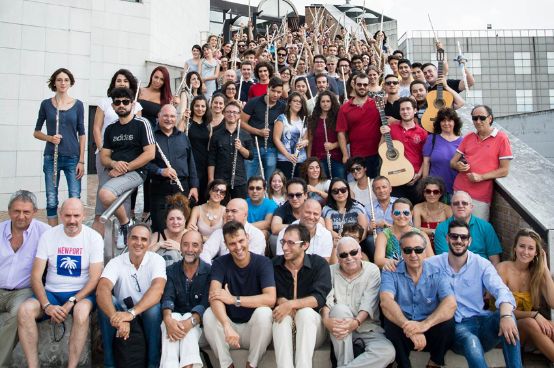A festival for the transverse flute
The Falaut International Flute Camp attracted 250 flautists and other musicians to Salerno this summer. It is an important meeting place for artists and teachers from all over the world.

Travel guides rightly rave about the Amalfi Coast as one of the most beautiful coasts in the world. Nowhere else will you find more breathtaking views. Artists have always traveled there to find inspiration for their works. The Italian Flute Society, under the artistic direction of Salvatore Lombardi, organized the major musical event on the campus of the University of Salerno from 2 to 8 August. The whimsical word invention "falaut" is a playful combination of flute and some syllables of solmization, which goes back to Guido of Arezzo.
Stimulate conversations
One of the core ideas of the festival is to invite renowned artists in the field to perform in varied programs with the course participants and also to involve the next generation. This year, pupils, students, teachers and lecturers came from countries including Russia, China, Korea, Japan, the USA, Spain, Italy, Poland, Denmark, Norway and Switzerland. The program shows how flexible the instrument is and how extensive the repertoire is. There is jazz and contemporary music, music from the Baroque to the Romantic period. There were also courses for guitar, harp, violin and double bass. There were suggestions for everyone, from amateur flutists to semi-professionals and professionals. One of the main aims of the Flute Society is to bring as many interested people together as possible.
Personal lecturers
This summer camp has an interesting concept: a personal instructor is selected when you register. He or she is the first point of contact throughout the week. He or she will give you lessons that are organized very differently by the instructors. Some teachers are available to the students all day, others have individual and class lessons spread throughout the day or concentrated lessons. Participants have the opportunity to attend and listen to all classes. Individual lessons with other teachers are also possible on request.
There are also three public master classes per day. The lecturers teach in a large lecture hall in front of an interested audience. The topics are usually freely chosen. Sometimes, however, special subjects are covered, such as piccolo, Alexander technique, orchestration, etc. So you circulate around all day and choose what interests you most. In addition, the numerous lecturers present their impressive skills in concerts at lunchtime and in the evening. The standard was usually dizzyingly high.
Passion as the key to success
As you can imagine, there is a concentrated load of knowledge, experience and expertise. The atmosphere is relaxed and friendly. On the first day of the course, there was still general confusion as to who was where. It was also easy to get lost on the university's large campus. So you joined a group of people and almost by magic, students and teachers appeared in the right place. Before you knew it, there were flutes, violins and plucks coming from every room. A program booklet with all the necessary information about the festival was distributed in the afternoon of the first day. From then on there was order and clarity. An organizational masterpiece.
The summer camp as it is today has grown slowly. It all started 10 years ago with a normal summer course. The location has always changed, but it has always taken place in the Salerno area. Slowly, the event grew to its current size. Last year it was held at the University of Salerno for the first time. 70 flautists traveled there. This year there were already 200 flautists and 50 other instrumental musicians. Of these, 40% were foreigners. A worldwide network is thus maintained and expanded. The feedback was consistently positive. Festival organizer Salvatore Lombardi is convinced: "The key to success in flute playing is passion.








